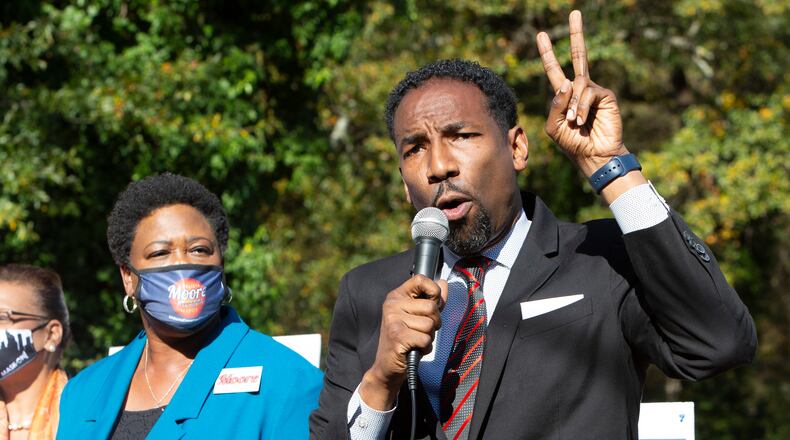Four years ago, Felicia Moore was in a runoff for City Council president against fellow City Council member Alex Wan, an agreeable Georgia Tech grad who finished first in the general election.
As the runoff neared, 10 of the 15 sitting council members and two incoming newbies threw in with Wan, publicly endorsing him against Moore. None of her colleagues endorsed her. It was an absolute rebuke, like a high school class shunning the peculiar kid.
Over two decades in office, Moore had been a thorn in the side of three mayors and was not great at playing well with others. It seemed the mass endorsement might sink Moore. It didn’t. She hammered Wan by 9 percentage points and became Madam President.
Here we are again. Recently, five council members publicly backed City Councilman Andre Dickens, another pleasant Georgia Tech grad, in his mayoral runoff against Moore. None have gone for her. Additionally, two former mayors, Shirley Franklin and Andrew Young, also endorsed Dickens. On Friday afternoon, Mayor Keisha Lance Bottoms decided to throw in with Dickens.
Former Mayor Kasim Reed, the surprise third-place finisher, has been silent. There’s no way he’ll back his longtime archenemy. And he’d have to close his eyes and breathe deeply to go with the whippersnapper who knocked him from the race.
Dickens, a deacon who also lists dozens of preachers on his endorsement page, has been pushing hard to collect Reed’s scraps (22.4%) in trying to catch up with Moore, who got 41% of the vote to Dickens’ 23%.
Credit: CURTIS COMPTON / AJC
Credit: CURTIS COMPTON / AJC
Reed did relatively well in the city’s predominantly Black precincts in southwest Atlanta, where Dickens hopes to play catchup. Moore did well on the city’s white Northside and the gentrifying east side.
At a recent event, Fulton County Commissioner Marvin Arrington Jr., a contributor to the Reed campaign, endorsed Dickens. Young, who earlier endorsed Reed, has also thrown in with Dickens but doubts he’ll cut a TV ad for him, telling me he doesn’t “want to look like I was jumping from one candidate to another.”
Councilman Michael Bond, who endorsed Dickens (as he did Wan in 2017), said Moore “has positioned herself as a naysayer at City Hall.” Her entrance to the City Council in 1998, he said, was harsh: “She was very hard on her colleagues; she’d call people crooks.”
The mass endorsement, he said, “tells an unspoken tale from the people who work with you. Who receives or doesn’t receive tells a lot.”
Moore, in an interview, waved off the dearth of collegial love. “It hasn’t mattered; they should have learned their lesson before,” she told me. “You’ve aptly said I’m a thorn in the side of mayors. I’ve also been a thorn in the side of council members. It’s go along to get along. I’ve not only been independent; I’ve been vocal. It doesn’t sit well.”
Dickens has picked up criticizing Moore as a Madam No. In a recent debate, he said, “There’s no body of work. There’s a lot of tsk tsking saying things are bad, saying the glass is half empty.”
He likes to say Moore was a “No” vote on the now wildly popular Beltline, which is almost blasphemous. A check in the story files shows she was on the short side of a 12-3 vote in 2005 to create a special tax district to fund the project. The story said, “Opponents argue the proposal leaves out low-income families and focuses too much on development.”
One of Dickens’ talking points, besides creating the city’s Transportation Department, is his push to include affordable housing on the Beltline because for years, what Moore had predicted in 2005 has occurred. She’s beaten him up on his losing vote last year to hold back police funding to get the force to meet training benchmarks.
The two candidates share a history in that they would be the first Atlanta mayor to come from the Neighborhood Planning Unit (NPU) system, which was set up decades ago by Mayor Maynard Jackson to give residents a voice in what happened in their communities. In fact, Moore was Dickens’ councilperson when he was active in neighborhood causes, as she had been before him. She likes to brag her northwest side district of 20 years covered “Bankhead to Buckhead,” and she represented people rich and poor and of all races.
Dickens continually underlines his Atlanta roots in a local-guy-does-well narrative fighting for the “Soul of Atlanta.” Moore tells her story of attending a historically Black college and moving to Atlanta because it provided opportunity.
One of the City Council members lining up with Moore is Derrick Boazman, who has been gone from that body for 17 years. Former members Yolanda Adrean and Gloria Bromell-Tinubu also support Moore.
“Nobody (from city government) endorsed her and I did so for that very reason,” he said. “She is independent. The establishment lining up on the other side is a sign that Felicia doesn’t owe them anything. Atlanta needs a different kind of leader. I want someone who’ll implode it all and build new relationships.”
One will work around the edges. One will blow it up. Voters’ choice.
About the Author
Keep Reading
The Latest
Featured





